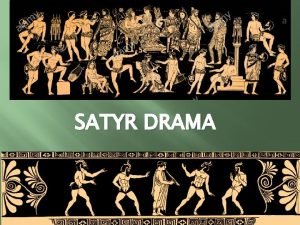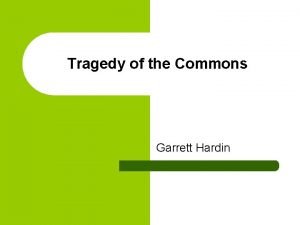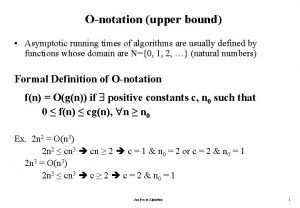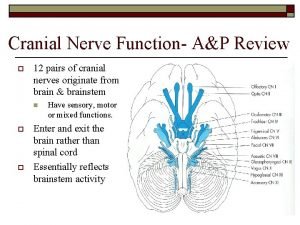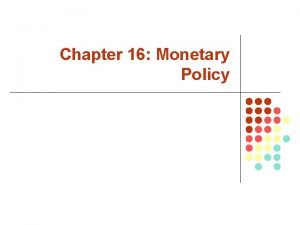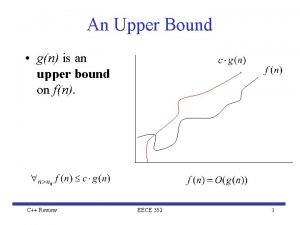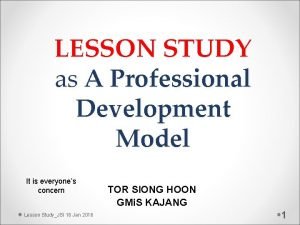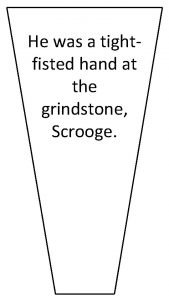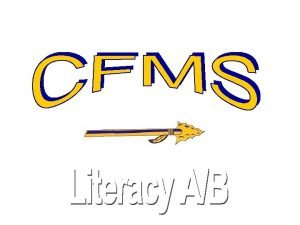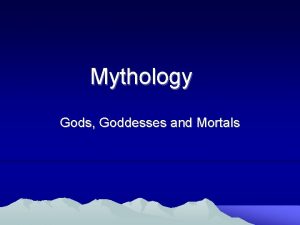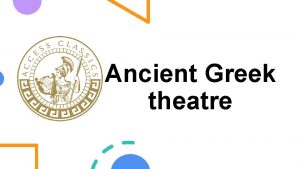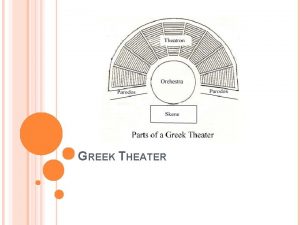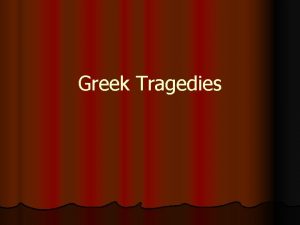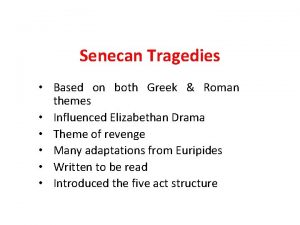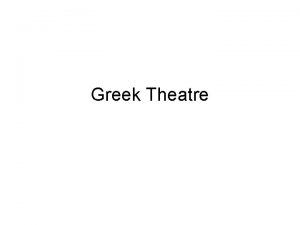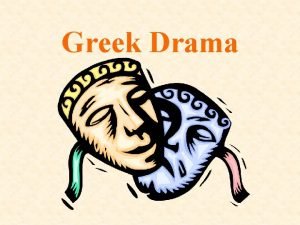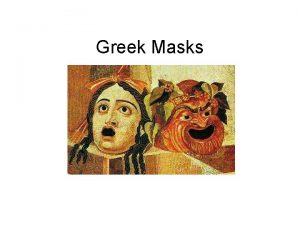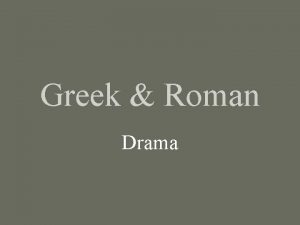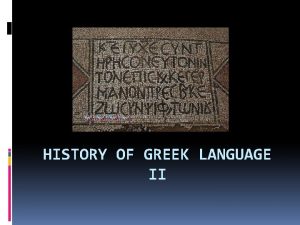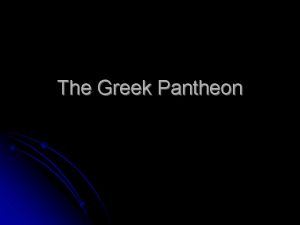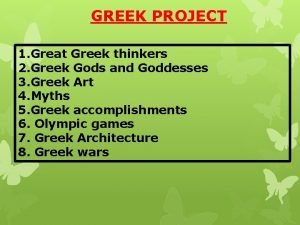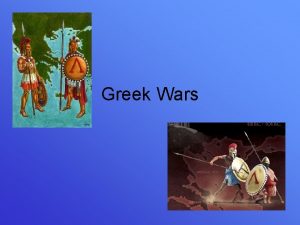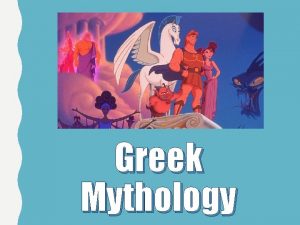The structure of most Greek tragedies a tight























- Slides: 23

The structure of most Greek tragedies a tight, formal arrangement of parts, including: The Prologue [opening scene] The Parodos [first of the Chorus’s lyric songs] A regular alternation of scenes in Dialogue and Choral Odes The Exodos [concluding scene]

Aristotle’s definition of Greek tragedy “an imitation of an action that is serious, complete, and of a certain magnitude; in language embellished with each kind of artistic ornament, the several kinds being found in separate parts of the play; in the form of action, not of narrative, through pity and fear effecting the proper purgation of these emotions” (VI. 2, p. 23).

Aristotle’s Definition of Tragedy A Greek Tragedy…. is based on past events familiar to the audience; has a main protagonist of noble status or birth; whose downfall is caused by a character flaw; who, in spite of his flaw, gets sympathy from the audience; who gains self-knowledge through his fall; has a plot that unfolds in one place in a short period of time, usually about a day. allows the audience the chance to experience catharsis (a release of pent-up emotions)

Key Aristotelian terms used in tragedy Hamartia Hubris Anagnorisis Peripeteia Catharsis

Hamartia: an error in judgment, a mis “doing, ” not a flaw in character necessarily, brings about the hero’s misfortune. An element of plot not character.

Hubris: excessive pride Hubris or hybris exaggerated self pride or self-confidence (overbearing pride), often resulting in fatal retribution.

Peripateia sudden reversal of fortune from good to bad. (Think “wheel of Fortune” model)

Anagnorisis Startling discovery; moment of epiphany; time of revelation when a character discovers his true identity. the “Aha!” or “Oh no!” moment of the play

Catharsis a release of tension / pent-up emotions. to describe the effect on the audience consists in cleansing the audience of disturbing emotions, fear pity thereby releasing tension.

Catharsis Occurs in one of two ways: 1. Audience members resolve to avoid conflicts of the main character that arouse fear or pity, or 2. audience members are purged or cleansed by transferring their own pity and fear to the main character, thereby emptying themselves of these disquieting emotions. Either way, They leave theater as better persons intellectually, morally, or socially.

Dramatic irony incongruity between a situation developed in a drama and the accompanying words or actions understood by the audience but not by the characters Sophocles’ audience would have been familiar with this plot having more information about the action than the characters on stage. Failure of a character to see or understand what is obvious to the audience. This is called dramatic irony or tragic irony.

The tragic hero * ideal man of great importance * superhuman or divine traits * attractive, strong, and able * follows code of honor * for which he is willing to sacrifice his life * acts with courage and dignity in the face of defeat * has the same desires as an ordinary man 1. desire for wealth, 2. desire for family, 3. desire not to bring shame to himself or his family * becomes tragic when a fault or error brings about the hero’s destruction

Antagonist Chief opponent of the protagonist, or main character sometimes beyond a “good guy/ bad guy” relationship

Greek plays observe three unities: Unity of time Unity of place Unity of action/subject

unity of time all the action of the play takes place within 24 hours; dialogue provides background information

unity of place action is limited to one setting; one unchanged scene is used.

unity of subject/action the focus is on one main character; there are no sub-plots.

Chorus 15 -20 men representing the citizens are always on stage. There is a leader who carries on a dialogue with the main characters.

The Chorus Performed in song with a highly formal and stylized back-and-forth movement that heightened the emotion of their performance: Strophe - first part of a choral ode (moving to the left) Antistrophe - follows the strophe (moving to the right) Epode - completes the chorus’s movement (standing still)

The function of the chorus set the tone give background information recall events of the past interpret and summarize events ask questions at times, give opinions (commentators) give advice if asked, stay objective in the sense that it does not disagree with the leading character act like a jury of elders or wise men who listen to the evidence of the play and reach a moralistic conclusion at the end Serve as a representation of society: “ideal spectator” by providing advice, opinions, questions to the audience and actors. Expressing moral, religious, and social attitudes.

Fate Destiny The Greeks believed that everything happened for a reason and that the path they led in life, was prescribed for them by the Gods and that there was no escaping their fate or destiny.

Prophecy Fate and prophecy were two of the great controversies of Sophocles’ day. Ancient Greek religious tradition depended on prophecy and fate. What the gods predicted for man.

Thanks
 Tragic definition literature
Tragic definition literature Satyr adalah drama
Satyr adalah drama Hypocrite origin
Hypocrite origin Elizabethan tragedies were modeled on plays from
Elizabethan tragedies were modeled on plays from Characteristics of shakespearean tragedies
Characteristics of shakespearean tragedies Trgedy of the commons
Trgedy of the commons Monetary policy
Monetary policy Upper bound asymptotic notation
Upper bound asymptotic notation Tight junction fungsi
Tight junction fungsi Brutal denotation
Brutal denotation Neutral denotation
Neutral denotation Cn xi test
Cn xi test Ano ang tight money policy
Ano ang tight money policy Desmosomes
Desmosomes Upper bound c++
Upper bound c++ The tight lengthwise yarn in a weave pattern
The tight lengthwise yarn in a weave pattern Football tackling wheel
Football tackling wheel Tight spacing yearbook
Tight spacing yearbook Octomer
Octomer Tight junction
Tight junction Tight dalam plc
Tight dalam plc He was a hand at the grindstone
He was a hand at the grindstone Player denotation
Player denotation What is the greek miracle in greek mythology
What is the greek miracle in greek mythology

